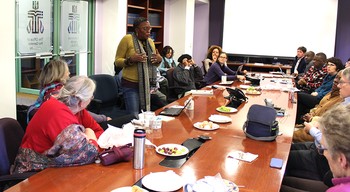Presbyterian Mission Agency staff received an update on life in Sierra Leone, post-Ebola this week. Two people, one who lives and works in the troubled country and another who works there, spent several days with staff in Louisville, reporting on the physical, psychological and economic health of the country, where more than 8,000 Ebola cases were confirmed and nearly 3,600 people died.
The visit comes on the heels of the World Health Organization’s announcement that Liberia, one of the three-worst hit west African nations, was finally declared Ebola-free at nearly the same time there was another confirmed Ebola death in Sierra Leone. At the virus’ peak, Sierra Leone, Liberia and Guinea were devastated by the outbreak, leaving thousands dead and the economies of the three nations in ruins.
“The word ‘Ebola’ sends fear into my heart,” said Ebun James-DeKam, general secretary for the Council of Churches in Sierra Leone. “This has been a humbling experience. We lost a lot of people.”
Dekam told the ministry teams a number of factors led to the outbreak in 2014 including a lack of understanding about the virus and its cause, access to remote areas of the country, a distrust of government and the Ministry of Health and a late response by the World Health Organization.
The disease contributed to economic fallout in the region as businesses, markets and transportation operations were closed down to keep Ebola from spreading.
“Mining employed a lot of young people and because of the virus, people were not able to lead their normal lives, impacting bread winners, fathers and mothers,” James-DeKam said. “Farmers were restricted by quarantines and unable to tend to crops. Approximately 90 percent of the farm plots were not prepared or cultivated.”
“You cannot put money value on the damage. There are hundreds of children without parents, wives without husbands and many young girls have become pregnant,” said James-DeKam. “There are families where everyone died. My own mother got sick and I could not touch her. It’s difficult to explain how hard it has been. If your child became sick, you could not touch them. Our first reaction is always to mother our child.”
Over the past year, the West Africa Initiative—a collaboration of Presbyterian Hunger Program (PHP), Self-Development of People (SDOP) and Presbyterian Disaster Assistance (PDA)—have worked with the council and other groups to distribute chlorine water solutions for handwashing as well as food and non-food items. Even worship services have been altered to protect people from the spread of the virus.
Ministers are refrained from touching members of their congregations, no laying of hands. Communion services have been altered so that there is no common cup. The elements must be distributed in latex gloves. Even the sermons are less about sin and more about hope and compassion according to James-DeKam.

Presbyterian Mission Agency staff hosted representatives from Sierra Leone. (Left to Right) Valery Nodem, PHP international associate; Winston Carro, WAI program director; Cynthia White, SDOP coordinator; Ebun James-DeKam and Luke Asikoye, PDA international associate. —Rick Jones
“Our goal is to strengthen and support rural communities and help people in those communities become self-reliant,” said Winston Carro, program director for the West Africa Initiative. “There are predictions of a severe food crisis, but I have doubts it will come to that. Preparations have been made and there has been a lot of work to make communities sustainable.”
Carro adds the WAI has provided community handwashing stations, education and information about the disease, school supplies for nearly 1,000 students and helped with the cultivation of farmland for dry season farming.
Valery Nodem, international associate with the Presbyterian Hunger Program, has traveled to the region on behalf of the church with other ministry team members including Luke Asikoye, associate with Presbyterian Disaster Assistance, and Cynthia White, coordinator for the Presbyterian Committee on the Self-Development of People.
“When we talk about resiliency, these countries have shown it continuously,” said Nodem. “Coming out of civil war and rebuilding their lives was a difficult step that took people in the country years to achieve and they did it. Then battling Ebola pulled everything down. Now you go and still see people rising and working to rebuild. It’s a big lesson that’s being taught every day.”
“What we realized early on is that all three ministry areas were working in Sierra Leone and it made more sense to do that work together to have a greater impact,” said White. “We have been able to reach communities and do great training, enabling community groups to begin community farming and micro-enterprises. It’s a collaboration that made sense and has worked very well.”
Asikoye says the key to the country’s recovery is knowing when not to interfere. “Respect their values and let them be decisive, allowing them to empower themselves. They will need support for a few more years, but the key is to let them work for their own future.”
Carro urges Presbyterians to learn more about the work of WAI. “People can travel to see how this model of development is working and impacting lives. People can also support the initiative financially by giving to the One Great Hour of Sharing. It’s amazing how far $100 can go for families in Sierra Leone.”
To learn more about the Ebola crisis and how to help, click here.

